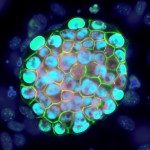Link to Pubmed [PMID] – 12080001
Biol. Reprod. 2002 Jul;67(1):70-9
Kit/stem cell factor (SCF ) has been reported to be involved in survival and proliferation of male differentiating spermatogonial cells. This kinetics study was designed to assess the role of Kit/SCF during spermatogenesis in mice, and the extent of male programmed germ cell death was measured between 8 and 150 days of age. For this purpose, 129/Sv inbred mice in which one Kit allele was inactivated by an nlslacZ sequence insertion (Kit(W-lacZ/+)) were compared with 129/Sv inbred mice with wild-type alleles at the Kit locus. Four different approaches were used: 1) morphometric study to assess spermatogenesis, 2) flow cytometry to study testicular cell ploidy, 3) in situ end labeling to detect apoptosis, and 4) follow-up of reporter gene expression. Spermatogenesis was lower in Kit(W-lacZ/+) heterozygous mice both at the onset of spermatogenesis and during adulthood. Indeed, greater apoptosis occurred at the onset of spermatogenesis. This was followed in the adult by a smaller seminiferous tubule diameter and a lower ratio between type B spermatogonia and type A stem spermatogonia in Kit(W-lacZ/+) mice compared with Kit(+/+) mice. These differences are probably related to the Kit haplodeficiency, which was the only difference between the two genotypes. Germ cell counts and testicular cell ploidy revealed delayed meiosis in Kit(W-lacZ/+) mice. Reporter gene expression confirmed expression of the Kit gene at the spermatogonial stage and also revealed Kit expression during the late pachytene/diplotene transition. These results suggest involvement of Kit/SCF at different stages of spermatogenesis.

